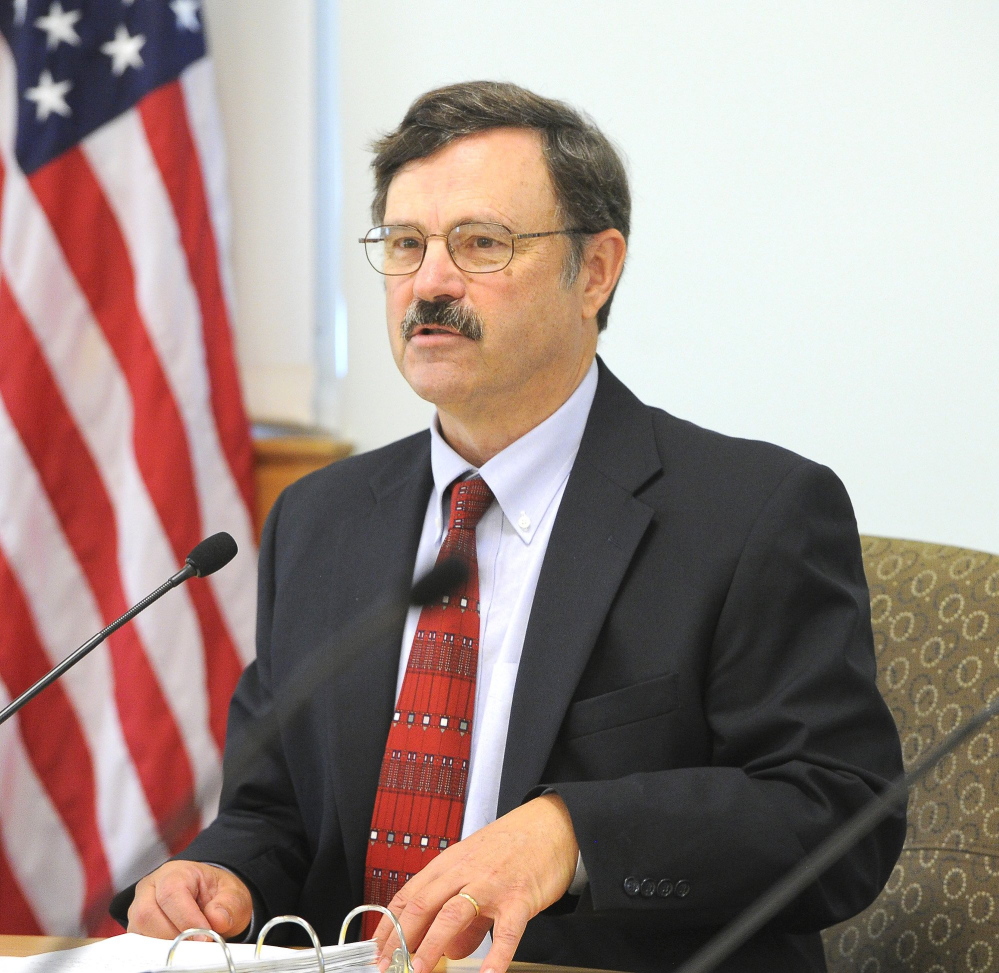Lawmakers will consider a bill in the upcoming legislative session to fix a conflict-of-interest problem that paralyzed the Maine Public Utilities Commission during its review of a controversial contract involving Nestle Waters North America, owner of the Poland Spring brand.
The bill, sponsored by Rep. Diane Russell, D-Portland, has the support of PUC Chairman Thomas Welch and the head of Gov. Paul LePage’s energy office, Patrick Woodcock, both of whom helped draft the language. It seeks to prevent a repeat of the recent situation in which the commission was immobilized by conflicts of interest that caused two of its three members to withdraw from the case.
The bill would create a mechanism by which alternate commissioners could be appointed to replace those who have to recuse themselves.
“We want to make sure that everybody has their day in court, so to speak, and to do so before commissioners without conflicts of interest,” Russell said. “I anticipate this will be a fairly nonpartisan issue.”
In October, the PUC was unable to rule on a case involving Nestle Waters and a family-owned utility in Fryeburg that supplies water that the company bottles under the Poland Spring brand. Welch recused himself because, when he was a lawyer at the Portland law firm Pierce Atwood, he represented Nestle Waters in a deal in 2008 that set the stage for the case in Fryeburg.
The case drew national attention because the two other commissioners also had ties to Nestle Waters.
Mark Vannoy recused himself in 2012 because of the extensive engineering work he had done for Nestle Waters. David Littell was a partner at Pierce Atwood a decade ago, although he did not work on behalf of Nestle Waters.
Public Advocate Timothy Schneider, whose office represents ratepayers in PUC proceedings, also was with Pierce Atwood, and represented Nestle Waters in the current case as recently as a year ago. He, too, recused himself.
With Welch and Vannoy out of the case, the PUC could not provide majority approval of a 25-year contract between Nestle Waters and the privately held Fryeburg Water Co. that would lock in rates for extracted water that some critics say would be too low.
National experts have said they have never seen a situation in which every member of a state utilities commission had a conflict in the same case.
“It’s a very rare but interesting problem,” Welch said. “I think the circumstances under which recusals have resulted in a lack of quorum I can count on one finger.”
ALTERNATES CHOSEN BY LOTTERY
Rep. Russell’s bill, L.D. 1619, would provide a path for multiple-recusal situations, through appointment of alternate commissioners who could replace those with conflicts. Under the current draft, five alternates would be nominated by the governor and reviewed and confirmed by the Maine Senate. When needed, one or more alternates – with no conflict in the case at hand – would be selected by lottery.
“This avoids any potential for future governors to manipulate the process by cherry-picking a commissioner for a case, and also eliminates the perception of a conflict,” Russell said.
Woodcock, head of the governor’s energy office, agreed.
“It would be counterproductive to have a situation where you could selectively appoint commissioners,” he said. “That would not be moving forward with an independent and deliberative commission and would include more, not less, politics.”
A public hearing on the bill will likely be held in early to mid-February. Russell and Woodcock said they welcome suggested improvements from experts and the public.
If passed as drafted, the law would take effect in January 2015, so the Nestle Waters case could resume thereafter. Welch said the parties in the case are continuing to operate under their existing contract, mitigating the economic damage of the PUC’s inability to make a ruling.
PERCEPTION OF PRO-UTILITY BIAS
Nestle Waters’ relationship with Fryeburg Water Co. has been subject to intense scrutiny in the Fryeburg area, in part because of other conflicted interests.
The local Hastings family has for decades controlled the water utility, which is not allowed to charge an outside bottler more than it charges its customers in Fryeburg and neighboring East Conway, N.H.
In the late 1990s, however, family patriarch Hugh Hastings and his son John created a separate pass-through company that bought the utility’s water for the regulated rate of about a tenth of a cent a gallon and sold it to Nestle Waters for many times more.
Critics of the proposed 25- to 40-year contract say Nestle Waters should be willing to pay the same, higher price it paid the pass-through company, which Nestle Waters bought from the Hastingses and their business partner in 2008 for an undisclosed sum. But Nestle Waters has refused to say what that rate was, and Hugh and John Hastings have testified to the PUC that they don’t remember.
In September, the PUC was the subject of a critical report from the Legislature’s independent watchdog agency, the Office of Program Evaluation and Government Accountability. The report identified problems with the commission, including a public perception that the commissioners and staff have a bias toward the utilities, for which many of them have worked.
“Past associations and current working relationships of this nature can create the risk of actual or perceived bias and can diminish public trust in the agency and its decisions,” the report said.
The office recommended that the PUC require ethics training for its staff, including training to “recognize blind spots and factors other than personal gain that may be influencing actions and decisions.”
Colin Woodard can be contacted at 791-6317 or at:
cwoodard@pressherald.com
Twitter: @WoodardColin
Copy the Story LinkSend questions/comments to the editors.





Success. Please wait for the page to reload. If the page does not reload within 5 seconds, please refresh the page.
Enter your email and password to access comments.
Hi, to comment on stories you must . This profile is in addition to your subscription and website login.
Already have a commenting profile? .
Invalid username/password.
Please check your email to confirm and complete your registration.
Only subscribers are eligible to post comments. Please subscribe or login first for digital access. Here’s why.
Use the form below to reset your password. When you've submitted your account email, we will send an email with a reset code.